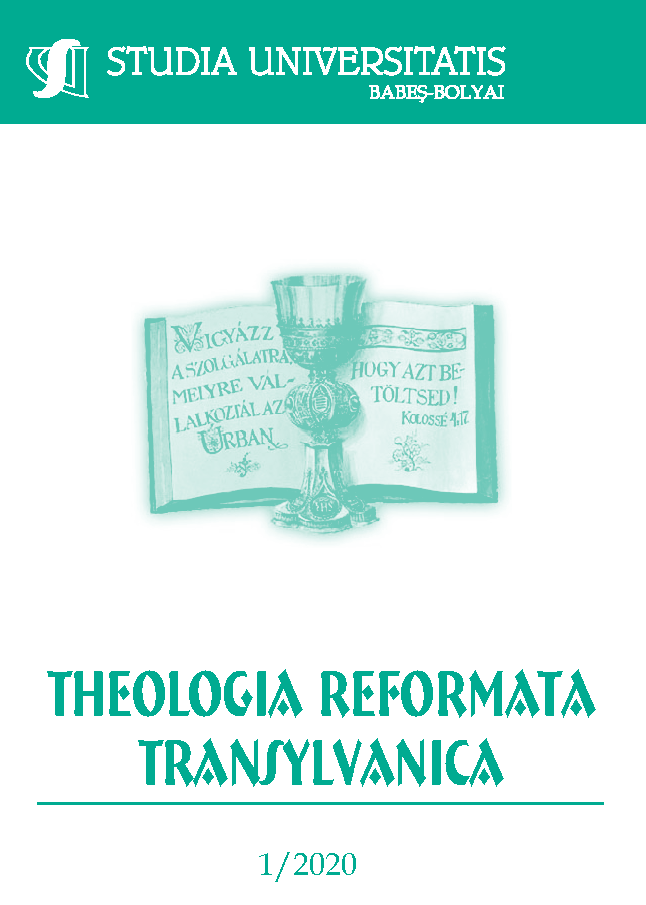Az újszövetségi „megbékélés” fogalom előfordulásainak és jelentéseinek áttekintése
DOI:
https://doi.org/10.24193/subbtref.65.1.05Keywords:
reconciliation, rapprochement, peace, ease, subsidesAbstract
Survey of the Meanings and Occurrences of the Terminology of Reconciliation in the New Testament.
Reconciliation may happen on three levels. The first one is to be reconciled with God. In this matter, God himself helps us, who took the first steps towards us after we had left him and had turned our back to him. He sent his only Son, who gave up his life in order to reconcile us with his Father, to restore the bro-ken connection, relationship, and peace. The second level is to be reconciled with friends. In this matter, it could help us a great matter, if one was reconciled with the Creator. To be reconciled with God means a task for human beings, as they have to be at peace with each other. Reconciliation with others may happen outwards and inwards. It happens outwards, when the relationship is handled with God, with the other, and with oneself. We speak about inwards reconciliation, when it happens between husband and wife, between friends (relatives, neighbours), between principal and subaltern, or enemies. The third level is to be reconciled with oneself. This may be the hardest task, because one has to fight oneself: you have difficult issues to let go, you have to be at peace with yourself in order to serve God and your neighbour as your Creator requires from you.
References
BOLYKI, János: „Igaz tanúvallomás.” Kommentár János evangéliumához, Budapest, Osiris Kiadó, 2001.
BREYTENBACH, Cilliers: Versöhnung. Eine Studie zur paulinischen Soteriologie, Wissenschaftliche Monographien zum Alten und Neuen Testament 60. Band., Neukirchener Verlag, Neukirchen-Vluyn, 1989.
BROWN, Colin (ed.): The New International Dictionary of New Testament Theology. H. VOR-LANDER – C. BROWN: s. v. καταλλάssw, The Paternoster Press, Carlisle, The Zondervan Corporation, Grand Rapids, Michigan, 1992. 166–177.
BRUCE, F. F.: The Letter of Paul to the Romans. An Introduction and Commentary. Inter-Varsity Press–William B. Eerdmans Publishing Company, Leicester–Grand Rapids, Michigan, 1992.
COLE, Graham A.: God the Peacemaker. How Atonement Brings Shalom, New Studies in Biblical Theology 25., Apollos, InterVarsity Press, Downers Grove, Illinois, 2009.
CONSTANTINEANU, Corneliu: The Social Significance of Reconciliation in Paul’s Theology. Narrative Reading in Romans, Library of New Testament Studies 421., T&T Clark, London–New York. 2010.
EILERS, Kent: Faithful to Save. Pannenberg on God’s Reconciling Action, T&T Clark Studies in Systematic Theology. Vol.10. T&T Clark, London–New York, 2011.
DIÓS, István (szerk.): Magyar Katolikus Lexikon. VIII. kötet. Schütz s. v. Istenre hagyatkozás, kivonulás, magány. Szent István Társulat, Budapest, 1993. 772.
FARKASFALVY, Dénes: A Római levél. Bevezetés, fordítás és magyarázat, Prugg Verlag, Eisenstadt, 1983.
FINDEIS, Hans-Jürgen: Versöhnung – Apostolat – Kirche. Eine exegetisch-theologische und rezeptionsgeschichtliche Studie zu den Versöhnungsaussagen des Neuen Testaments (2 Kor, Röm, Kol, Eph), Echter Verlag, Echter Würzburg, 1983.
FISCHER, Georg – BACKHAUS, Knut: Sühne und Versöhnung. [Perspektiven des Alten und Neuen Testments], Die Neue Echter Bibel. Themen Band 7., Echter, Würzburg, 2000.
GNILKA, Joachim: Das Matthäusevangelium 1,1-13,58. I. Teil., Herders Theologischer Kommentar zum Neuen Testament, Herder, Freiburg–Basel–Wien, 1986.
GOULDER, Michael D.: Luke. A New Paradigm, Journal for the Study of the New Testament Supplement Series 20. Sheffield Academic Press, Sheffield, 1994.
GUNDRY, Robert H.: Matthew. A Commentary on His Handbook for a Mixed Church under Persecution, William B. Eerdmans Publishing Company, Grand Rapids, Michigan, 19942.
HAAG, Herbert: Bibliai Lexikon. S. v. kiengesztelődés. Apostoli Szentszék Könyvkiadója, Buda-pest, 1989. 974–978.
JAHNEN, Luz: Bosszú, erőszak és megbékélés, Santo Stefan, 2008.
JOHNSON, Luke Timothy: The Gospel of Luke, Sacra Pagina Series volume 3., The Liturgical Press, Collegeville, Minnesota, 1991.
KÁLVIN, János: Evangéliumi harmónia I. Magyarázat a Máté, Márk és Lukács összhangba hozott evangéliumához. Ford. Rábold Gusztáv, I. kötet. Kolozsvár, [s. n.], 1939.
KÁLVIN, János: A Filippiekhez írt levél magyarázata, A Magyarországi Református Egyház Kálvin János Kiadója, Budapest, 1992.
KEAZIRIAN, Edward M.: Peace and Peacemaking in Paul and the Greco-Roman World, Studies in Biblical Literature vol. 145. Peter Lang Publishing, New York–Washington, D.C./Baltimore–Bern–Frankfurt–Berlin–Brussels–Vienna–Oxford, 2014.
KUECKER, Aaron: The Spirit and the ’Other’. Social Identity, Ethnicity and Intergroup Reconciliation in Luke–Acts, T&T Clark International, London–New York, 2011.
LALDINSUAH, Ronald: Responsibility, Chastisement and Restoration. Relational Justice in the Book of Hosea, Langham Monographs, Carlisle, 2015.
MARTIN, Ralph P.: Reconciliation. A Study of Paul’s Theology, John Know Press, Atlanta, 1981.
NOLLAND, John: Luke 9:21–18:34, Word Biblical Commentary, volume 35B. Word Books, Dallas, Texas, 1993.
OSBORNE, Kenan B.: Reconciliation & Justification. The Sacrament and its Theology, Paulist Press, New York/Mahwah, 1990.
PRIOR, David: Pál első levele a korinthusiakhoz, Harmat, Budapest, 1995.
SCHENKER, Adrian: Versöhnung und Sühne. Wege gewaltfreier Konfliktlösung im Alten Testament Mit einem Ausblick auf das Neue Testament, Biblische Beitrage 15., Verlag Schweizerisches Katolisches Bibelwerk, Freiburg, 1981.
STOTT, John R. W.: The Message of the Sermon on the Mount. Christian Counter-Culture, Inter-Varsity Press, BST. Leicester, 1993.
STOTT, John R. W.: The Message of Romans. God’s Good News for the World. Inter-Varsity Press, BST. Leicester, 1994.
STOTT, John R. W.: A Timóteushoz írt első levél és a Tituszhoz írt levél, Harmat, Budapest, 2000.
SZABÓ, Eszter: Győzelem a harag felett, in: Életünk, 15. évf., 11. szám.
TAYLOR, Vincent: Forgiveness and Reconciliation. A Study in New Testament Theology, MacMillan and Co., Limited, London, 1941.
TŐKÉS, István: A korinthusbeliekhez írt második levél magyarázata, Erdélyi Református Egyházkerület, Kolozsvár, 1996.
VARGA, Zsigmond J. (szerk.): Görög–magyar szótár, Református Zsinati Iroda Sajtóosztálya, Budapest, 1992. 516.
VEGGE, Ivar: 2 Corinthians – a Letter about Reconciliation. A Psychagogical, Epistolographical and Rethorical Analysis, Wissenschaftliche Untersuchungen zum Neuen Testament 2., Rei-he. 239., Mohr Siebeck, Tübingen, 2008.
Downloads
Published
How to Cite
Issue
Section
License
Copyright (c) 2020 Studia Universitatis Babeș-Bolyai Theologia Reformata Transylvanica

This work is licensed under a Creative Commons Attribution-NonCommercial-NoDerivatives 4.0 International License.






